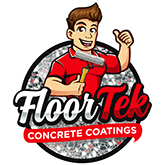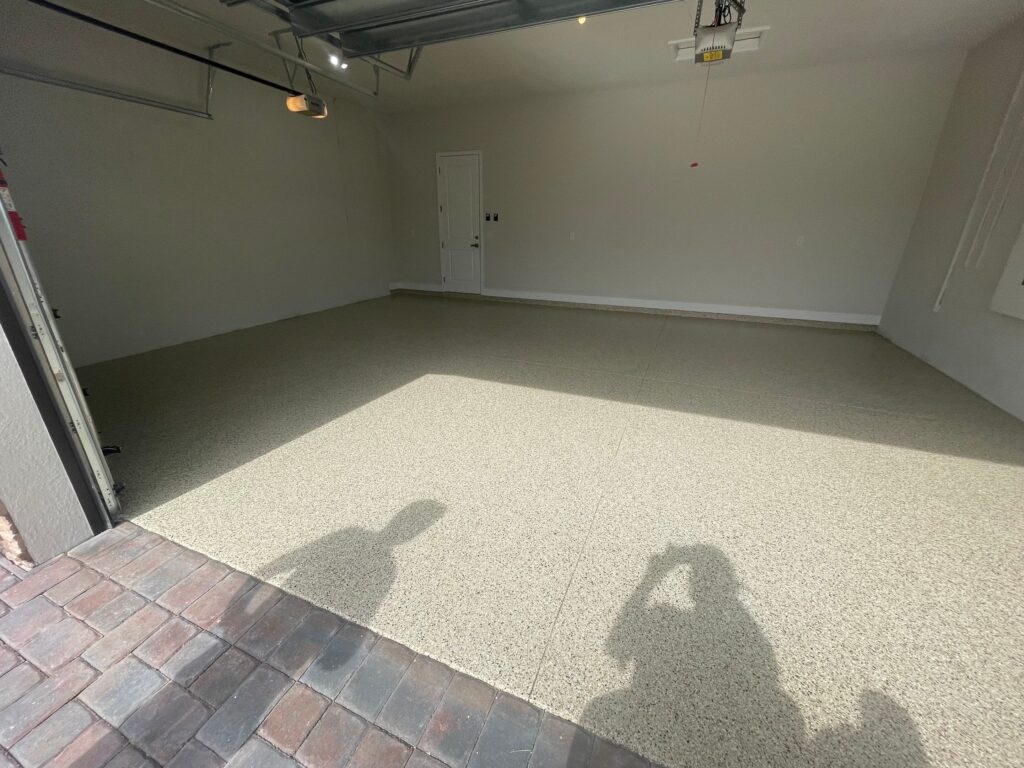Two popular floor coating options for your home are polyaspartic and epoxy coatings. Both offer excellent durability and protection for concrete surfaces, but key differences can affect your decision. This guide compares polyaspartic and epoxy floor coatings to help you determine the best choice for your garage, patio, or driveway.
What Are Polyaspartic and Epoxy Floor Coatings?
Polyaspartic Floor Coatings
Polyaspartic coatings are a type of polyurea resin. They are created by mixing an isocyanate with an amine, resulting in a durable, fast-curing material. Polyaspartic coatings are highly flexible and resistant to impacts, abrasions, and chemicals, making them ideal for residential applications that require long-lasting protection.
Epoxy Floor Coatings
Epoxy coatings are made by mixing a resin with a hardener, creating a strong and durable surface. They are known for their glossy finish and long-lasting protection and are commonly used in residential and commercial settings. While durable, epoxy does have some limitations, especially compared to polyaspartic coatings.
Polyaspartic vs Epoxy: Key Differences
Durability
When it comes to durability, polyaspartic coatings lead the way. A comparison of polyaspartic vs. epoxy floor coatings shows that polyaspartic is more resistant to impacts, abrasions, and UV damage. It is 10 times more durable than epoxy, making it ideal for high-traffic areas like garage floors, driveways, and patios.
Curing Time
Polyaspartic coatings cure much faster than epoxy. While epoxy can take up to 72 hours to fully heal, polyaspartic coatings can cure in as little as 1 hour, allowing you to use the floor sooner with less downtime. This quick curing time makes polyaspartic coatings a more convenient choice for homeowners looking to get their spaces back in use quickly.
UV Resistance
One significant drawback of epoxy floor coatings is their tendency to yellow or fade when exposed to UV rays. Polyaspartic coatings, however, are highly UV stable and will not discolor or fade over time, making them an excellent option for outdoor applications like patios and pool decks.
Flexibility
Polyaspartic coatings are much more flexible than epoxy coatings, reducing the risk of cracking under pressure. This flexibility makes polyaspartic coatings an excellent choice for floors that experience shifting or heavy usage, like garage floors or driveways.
Benefits of Polyaspartic Floor Coatings
Quick Installation
You can say goodbye to the long wait with poly aspartic floor coatings. They can be applied and cured in a fraction of the time needed for epoxy floor coatings, ensuring polyaspartic installations are a much faster installation process and minimal downtime for homeowners.
Chemical Resistance
Polyaspartic coatings offer superior protection against various chemicals, including oils, gasoline, and household cleaners. This makes them perfect for high-use areas like garage floors, laundry rooms, and basements, where spills are more likely to occur.
Long-lasting Appearance
Polyaspartic coatings are UV-resistant and will not turn yellow or fade with time. This ensures that your floors remain vibrant and visually appealing for many years, especially for areas exposed to sunlight, such as patios, pool decks, and driveways.
Polyaspartic vs Epoxy Floor Coating: Cost Comparison
While epoxy coatings may seem more affordable upfront, it’s essential to consider the long-term value. Polyaspartic coatings offer better long-term value with enhanced durability and faster curing times. Despite the slightly higher initial investment, their longevity and reduced maintenance costs make them a cost-effective choice in the long run.
Which One is Right for Your Floors?
The decision between polyaspartic vs epoxy floor coating depends on your specific needs:
- If you’re looking for a coating that offers faster installation and superior durability, polyaspartic coatings are the best choice.
- If you are on a budget and can afford slightly longer installation times, epoxy coatings could be a suitable and cost-effective solution for less demanding areas.
Polyaspartic coatings provide the best protection and a longer-lasting finish for high-traffic areas like garage floors, driveways, or patios. However, epoxy could be a suitable and cost-effective solution if you have less traffic or a smaller area,
Our Polyaspartic Coating Services
At Floortek Concrete Coatings, we specialize in polyaspartic floor coatings for various applications. Whether you need a garage floor coating service, a patio coating service, or a pool deck coating service, we have the right solution.
We offer high-quality polyaspartic coatings that provide exceptional durability and aesthetic appeal for any room in your home. Our professional installation services ensure that your floors receive the best treatment for long-lasting results.
Our Services Include:
- Garage Coating Service
- Patio Coating Service
- Pool Deck Coating Service
- Driveways Coating Service
- Sidewalks Coating Service
- Laundry Rooms Coating Service
- Basements Coating Service
Why Choose Us?
- Manufacturer-Direct Value
We work directly with manufacturers to offer the best prices on polyaspartic and epoxy floor coatings. - Life-of-the-Home Warranty
Our coatings come with a lifetime warranty, protecting your investment. - 30% Off Promotion for First-Time Installations
Save big on your first installation with our special promotion! - 10X Better Than Epoxy
Our polyaspartic coatings are far more durable than traditional epoxy floor coatings, offering better floor protection.
Service Areas
We proudly serve homeowners in Florida and Alabama with locations in:
FAQs: Polyaspartic vs Epoxy Floor Coating
1. What is the difference between polyaspartic and epoxy coatings?
Polyaspartic coatings are more durable, and flexible, and cure faster than epoxy, making them a superior choice for high-traffic areas.
2. Can polyaspartic coatings be used outdoors?
Yes, polyaspartic coatings are UV stable and won’t fade or yellow over time, making them perfect for outdoor applications like patios and driveways.
3. Which coating is better for my garage floor: polyaspartic or epoxy?
Polyaspartic coatings are better for garage floors as they offer superior durability, chemical resistance, and faster curing times.
4. How long does epoxy take to cure compared to polyaspartic?
Epoxy coatings can cure for up to 72 hours, while polyaspartic coatings cure in 1-2 hours.
5. Can polyaspartic coatings withstand chemicals?
Yes, polyaspartic coatings resist various chemicals, including oils and gasoline.
6. How much does polyaspartic coating cost?
While polyaspartic coatings can cost more initially, they provide long-term value due to their durability and minimal maintenance needs.
7. How do I maintain my polyaspartic floors?
Polyaspartic floors are easy to maintain with regular cleaning using mild detergent and a soft mop.
8. What colors and finishes are available for polyaspartic coatings?
We offer various colors and finishes to suit your home’s style and flooring needs.
9. Can polyaspartic coatings be applied to damaged floors?
Yes, polyaspartic coatings can be applied to most concrete surfaces, including those with slight damage.
10. Is there a warranty on polyaspartic coatings?
Yes, we offer a life-of-the-home warranty on all of our polyaspartic coatings.
Contact Us
Ready to enhance your floors with durable polyaspartic coatings? Contact us today for a free consultation and get started on your garage floor coating, patio coating, or pool deck service.
Florida Contact Number: 772-758-7215
Alabama Contact Number: 205-476-3232

